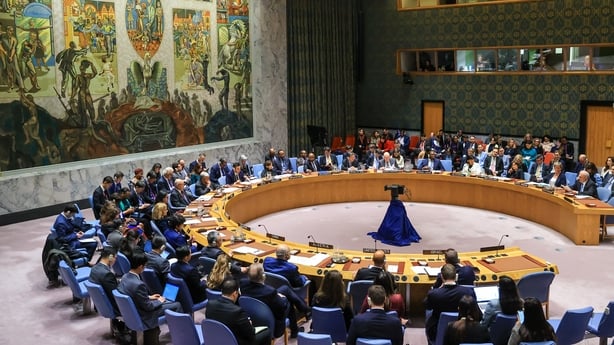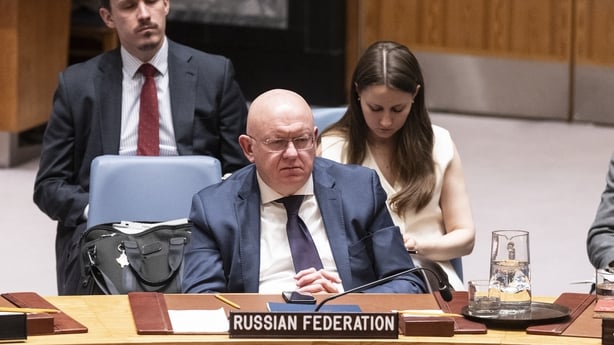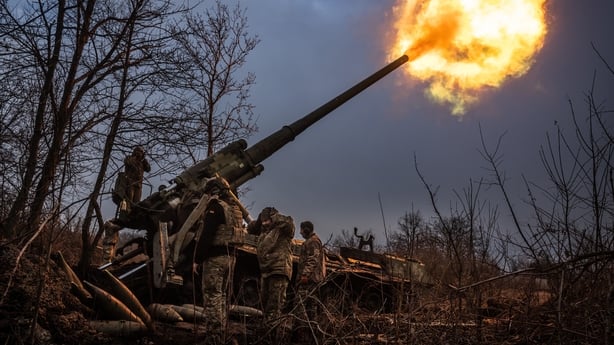The Kremlin, asked about an assertion by US President Donald Trump that Russia was open to European peacekeepers being deployed in Ukraine, has referred reporters to an earlier statement that such a move would be unacceptable to Moscow.
Russia has repeatedly said it opposes having NATO troops on the ground in Ukraine, with foreign minister Sergei Lavrov saying last week that Moscow would view that as a "direct threat" to Russia's sovereignty, even if the troops operated there under a different flag.
Asked about Mr Trump's comment, Kremlin spokesman Dmitry Peskov refrained from publicly contradicting the US president, but effectively reaffirmed Russia's opposition to the idea.
"There is a position on this matter that was expressed by the Russian Foreign Minister, Lavrov. I have nothing to add to this and nothing to comment on. I leave this without comment," said Mr Peskov.
Mr Trump said yesterday that both he and Mr Putin accepted the idea of European peacekeepers in Ukraine if a settlement was reached to end the war.
"Yeah, he will accept that," Mr Trump said. "I specifically asked him that question. He has no problem with it."
Brian Hughes, spokesman for the White House National Security Council, did not respond directly to the Kremlin's latest comment, saying the Trump administration would continue to work with Russia and Ukraine to end the war.
"President Trump's commitment to achieving an end to this brutal, bloody war and then establishing the framework for a lasting peace will not be negotiated through the media," Mr Hughes said.
"The Trump administration knows that sustaining peace requires Europe to do more, and we have heard leaders like (French) President (Emmanuel) Macron and British Prime Minister (Keir) Starmer - as well as others - offer to do just that. We continue to work with Russia and Ukraine for peace because you can’t end a war without talking to both sides."

US sides with Russia in UN votes on Ukraine in seismic shift
It comes after the United States sided with Russia twice last night at the United Nations, as they sought to avoid any condemnation of Moscow's invasion of its neighbour three years ago.
The two votes highlighted a seismic shift in the balance of power at the UN, where Washington had steadfastly voted for resolutions that favoured Ukraine and condemned Russia, until the abrupt rupture with Kyiv.
As Mr Trump stakes out a new position on the Ukraine war, Washington and Russia aligned first at a morning vote at the General Assembly and again at an afternoon vote of the Security Council.
A European-backed text won 93 votes for at the General Assembly and 18 votes against, with 65 abstentions and Washington sided with Moscow and Russian allies Belarus, North Korea and Sudan to vote against the text.
The resolution - which won far less support compared to previous ones on the war - strongly criticises Russia and emphasises Ukraine's territorial integrity and inviolability of its borders.
Washington drafted a rival resolution amid an intensifying feud between Mr Trump and Ukrainian President Volodymyr Zelensky.

But Ukraine's European allies pushed to heavily reword the US text to say that the "full-scale invasion of Ukraine" had been carried out by Russia, meaning Washington ultimately did not vote in favour of its own text.
Undeterred, the United States brought the earlier, unchanged text to a vote at the Security Council in the afternoon, securing its passage with ten votes for and none against - alongside five abstentions.
The abstentions were France, Britain, Denmark, Greece, and Slovenia.
France and Britain notably could have vetoed the resolution, which merely "implores a swift end to the conflict" without blaming Russia.
Several amendments, brought respectively by Russia and European nations, did not pass.
"We acknowledge the constructive changes in the United States position when it comes to the Ukrainian conflict," said Russia's UN envoy Vassily Nebenzya following the vote.
Tánaiste and Minister for Foreign Affairs Simon Harris described the events as concerning.
He said: "I think last night in the UN, what we saw develop at the Security Council, can't be described as anything other than concerning.
"The one good thing is European solidarity is holding, and the position of Ireland and the position of the European Union is consistent.
"In relation, we stand on the side of human rights, we stand on the side of international law, and we stand on the side of recognising that a country's territorial integrity is not in the gift of anybody else to discuss."

Relations between Washington and Kyiv have rapidly deteriorated following Mr Trump's return to the White House, with the US president claiming Mr Zelensky is highly unpopular and a "dictator".
Mr Trump's growing rupture with Ukraine has caused panic on a continent that has relied on US security assurance for 80 years.
The International Crisis Group's Richard Gowan said the EU won a "moral victory" in the General Assembly, but warned European diplomats will "worry that Russia and the US will route more resolutions on Ukraine through the Security Council -- potentially including asking for an endorsement of whatever deal Trump and Putin cook up".
Ahead of the Security Council vote, there was speculation on whether France or Britain would be prepared to wield their first vetoes in more than 30 years.
Read more:
Zelensky calls for 'real, lasting peace' for Ukraine
Ireland will aid Ukraine more 'on all fronts' - Martin
Their respective leaders, Emmanuel Macron and Keir Starmer, are visiting the White House this week for key talks on Ukraine.
The inviolability of Ukrainian territorial integrity was a cornerstone of previous resolutions passed at the UN, with the United States under former president Joe Biden among its strongest supporters.
"Neither these amendments, nor the resolution offered by Ukraine will stop the killing. The UN must stop the killing. We urge all Member States to join us in returning the UN to its core mission of international peace and security," said Washington's envoy to the UN, Dorothy Shea, ahead of the votes.
She later hailed the Security Council's passage of "an historic landmark agreement on Ukraine".
"We call on all other UN member states to join the United States in pushing for a durable peace that will bring stability to Europe and deter further aggression," said Ms Shea.
UN chief Antonio Guterres on Sunday called for a peace that "fully upholds Ukraine's territorial integrity" and respects the UN Charter.
We need your consent to load this rte-player contentWe use rte-player to manage extra content that can set cookies on your device and collect data about your activity. Please review their details and accept them to load the content.Manage Preferences

